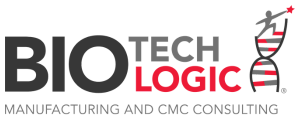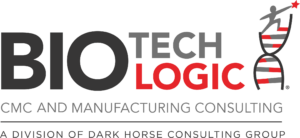CMC Strategy
BioTechLogic accelerates our clients’ path to market by identifying key process questions and organizing CMC priorities based on the therapeutic development stage, company goals, and development timeline.
Chemistry, Manufacturing, and Controls (CMC) is crucial for obtaining regulatory approval, and extensive documentation is required to demonstrate that a development team has a thorough understanding of its product and manufacturing process and that it has controls in place to ensure product quality.
What Is CMC for Biologics?
Throughout the therapeutics development lifecycle—from discovery to commercialization—CMC programs involve a range of activities to ensure a drug product’s quality, safety, and efficacy. CMC programs include the following:
Characterization
Identifying and understanding the physical, chemical, and biological properties of the drug substance. In the context of cell and gene therapies or other biologics, characterization requires demonstrating an understanding of the mechanism of action.
Process Development
Establishing a reliable, reproducible, scalable, and cost-effective manufacturing process.
Quality Control
Implementing methods to test the quality of raw materials, intermediates, and the finished therapeutic product.
Scale-Up
Moving from a lab-scale process to pilot scale and ultimately to commercial-scale production.
Facility and Equipment
Ensures that the manufacturing environment and equipment are fit for purpose and meet all regulatory standards.
Quality Assurance
Setting up a system to ensure that the finished product meets all quality specifications.
Quality by Design (QbD)
A systematic approach to development that begins with predefined objectives and emphasizes product and process understanding and process control based on sound science and quality risk management.
Regulatory Compliance
Ensures all activities throughout the product’s lifecycle comply with regulations and guidelines set by leading global regulatory agencies like the U.S. Food and Drug Administration (FDA) and European Medicines Agency (EMA).
When Should You Engage a CMC Partner?
Proactive investment in CMC is critical for avoiding costly obstacles and delays in the later phases of development.
A CMC partnership should begin when proof-of-concept data suggests that the therapeutic has promise and the development process is staged to begin. Engaging with a CMC partner early in the development process is helpful so that CMC matters can be adequately weighed as the gene therapy progresses through development.
Why Is It Important to Establish a Strong CMC Program Early in Development?
- Early-phase CMC work will help to establish parameter and attribute relationships and determine critical quality attributes (CQAs) as development advances.
- Data collection through in-process sampling and analytical testing establishes statistically supported answers as questions arise.
- Managing batch records and other essential information is critical to avoid costly backtracking and redocumentation efforts.
- A well-established and executed CMC program will increase the therapeutic’s value for development organizations intending to sell their asset to a larger company.




